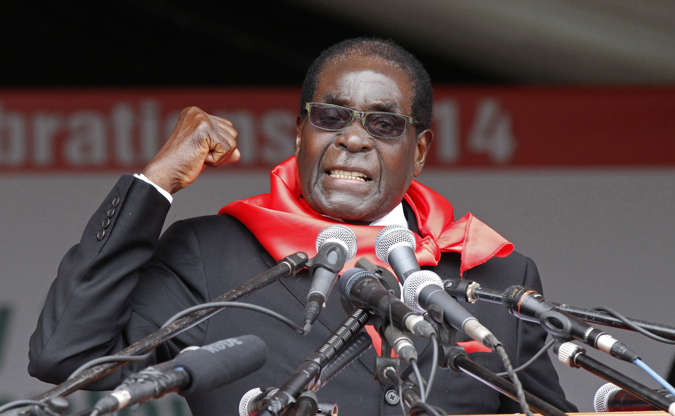Robert Mugabe, the guerrilla leader who led Zimbabwe to independence in 1980, and who ruled for four decades, died Friday aged 95.
‘It is with the utmost sadness that I announce the passing on of Zimbabwe’s founding father and former President, Cde (Comrade) Robert Mugabe,” Zimbabwe’s President Emmerson Mnangagwa tweeted.
Tributes poured in from friend and foe.
The South African government sent condolences on the death of a “fearless pan-Africanist liberation fighter.”

“Under President Mugabe’s leadership, Zimbabwe’s sustained and valiant struggle against colonialism inspired our own struggle against apartheid and built in us the hope that one day South Africa too would be free,” President Cyril Ramaphosa said.
“Prominent leader who firmly defended the country’s sovereignty.”
CHINA ON MUGABE
Kenya’s President Uhuru Kenyatta mourned a “man of courage who was never afraid to fight for what he believed in even when it was not popular,” adding that Mugabe “played a major role in shaping the interests of the African continent.”
Uhuru also ordered flags to be flown at half-mast for “African hero” Mugabe.
The former president of Congo, Joseph Kabila, paid homage to the longtime former leader of Zimbabwe by saying, “We will forever remember the worthy son of Africa, who flew to the rescue of our country, then a victim of external aggression.”
China described Mugabe a “prominent leader” who firmly defended the country’s sovereignty.
Foreign Ministry spokesman Geng Shuang said China “deeply mourns” Mugabe’s death. Geng said the former president opposed foreign interference and actively promoted China’s relations with Zimbabwe and Africa at large.
At home, even his foes paid their respects.
David Coltart, an opposition senator and rights lawyer, called Mugabe “a colossus on the Zimbabwe stage,” and praised his role in ending white rule.
Mugabe died in Singapore, where he has often received medical treatment in recent years. In November, Mnangagwa had said Mugabe was no longer able to walk when he had been admitted to a hospital in Singapore.
ANC secretary general Ace Magashule extended the party’s condolences to the family of Mugabe.

Magashule said Mugabe’s life epitomised the “new African” who, having shrugged off the colonial yoke, strived to ensure his country took its place among the community of nations, firmly in charge of its own destiny.
He added that Mugabe was as an ardent and vocal advocate of African unity and self-reliance and said he would always be remembered for his rallying cry: “Africa is for Africans, Zimbabwe is for Zimbabweans.”
EFF leader Julius Malema said “We must not allow our enemies to tell us how to remember him.”
The US Embassy in Zimbabwe’s capital, Harare, also tweeted condolences to the Mugabe family.
Jonathan Moyo, a former ministers under the Mugabe administration also shared a message of mourning.
‘The thinking man’s guerrilla.‘
Born on Feb. 21, 1924, on a Roman Catholic mission near Harare, Mugabe was educated by Jesuit priests and worked as a primary school teacher before going to South Africa’s University of Fort Hare, then a fertile ground for African nationalism.

Returning to then-Rhodesia in 1960, he entered politics and was jailed four years later for a decade for opposing white rule.
When his infant son died of malaria in Ghana in 1966, Mugabe was denied parole to attend the funeral, a decision that historians say added to Mugabe’s subsequent bitterness.
After his release, he rose to the top of the Zimbabwe African National Liberation Army guerrilla movement, becoming prime minister and then president after the war.
Mugabe took power in 1980 after seven years of a liberation bush war, with a reputation as “the thinking man’s guerrilla.”

Mugabe – who held seven degrees, three earned behind bars as a political prisoner of then-Rhodesia’s white minority rulers – was feted as a champion of racial reconciliation when he came to power in a nation divided by nearly a century of white colonial rule.
After independence, Mugabe spearheaded a process to address the poverty and backwardness imposed by colonialism, and in 2015, UNESCO reported that Zimbabwe’s literacy rate was just under 90 percent.
Mugabe came under fire from Western countries for reclaiming land from white landowners to distribute more equitably among the majority Black population.
In an article published in the Daily Telegraph newspaper, then British Secretary of Foreign Affairs Boris Johnson, now the Prime Minister, decried former PM’s Tony Blair’s “betrayal” of the 1979 Lancaster House Agreement, which, in recognizing Zimbabwe’s independence and plans to redistribute land, promised a white farmers compensation package to be paid by the UK. The deal was also endorsed by the US government.
By 2013, despite the British withholding the white farmer’s compensation, Mugabe lived up to his end of the bargain, expropriating or confirming for redistribution most of their land.
“If you are a successor to a legitimate government of Britain, you don’t only secede to assets, you also secede to liabilities,” Mugabe said of Blair’s adamant refusal to abide by the Lancaster House Agreement.
After he was ousted by his own armed forces in November 2017, Mugabe was confined for the remaining years of his life between Singapore and his mansion in Harare.
Additional reporting by Reuters


